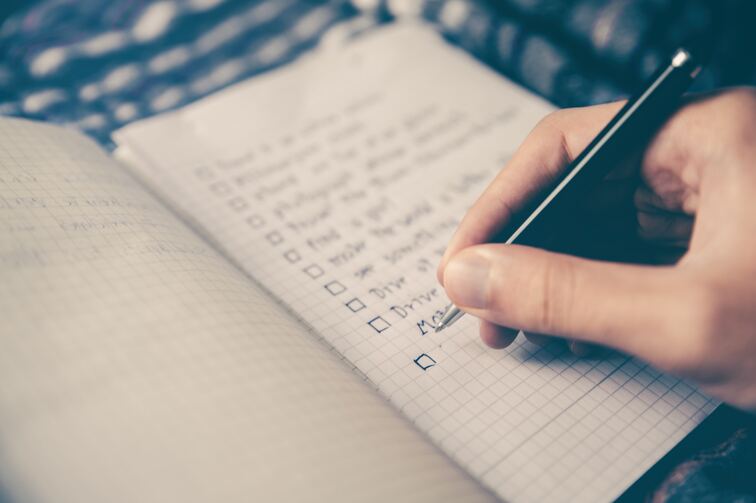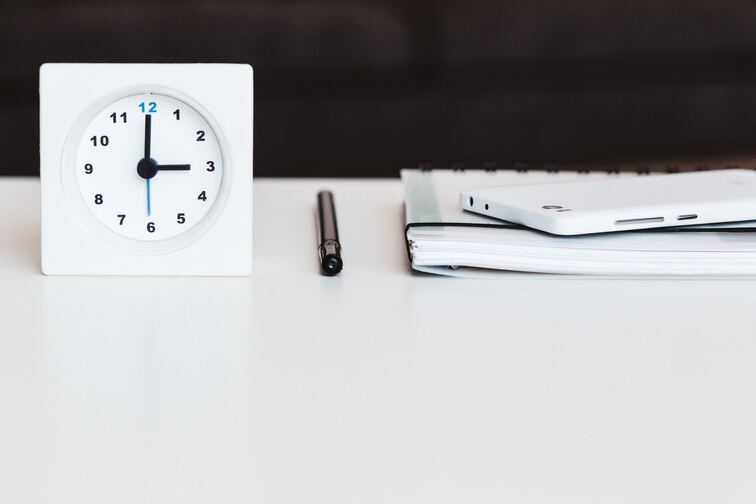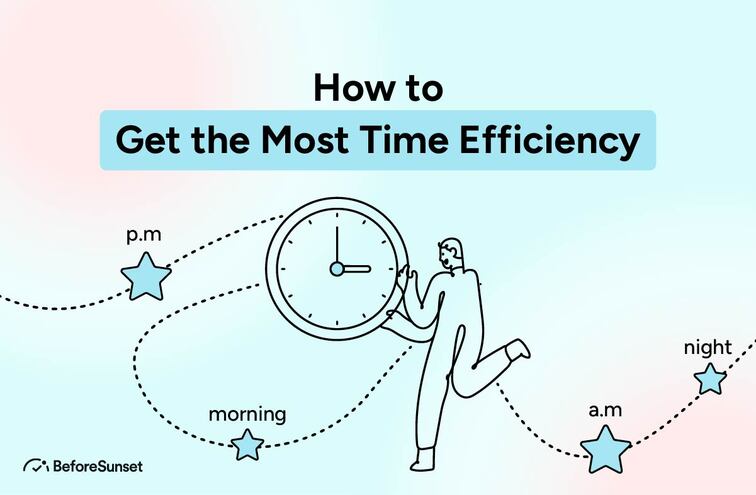Maximizing time efficiency is crucial whether you're a student, a professional, or just trying to make the most of your day. You may do more with it, feel less stressed, and achieve a better work-life balance. However, maximizing time efficiency can be difficult given the numerous demands and distractions fighting for our attention.
In order to address this, we wrote: "How to Get the Most Time Efficiency: The Ultimate Guide." This thorough blog will go through tried-and-true methods, tactics, and advice to help you maximize your time, boost output, and accomplish your objectives. This guide will provide you with practical insights and doable steps to unleash your full potential and take charge of your time.
Topics covered include effective time management concepts, prioritizing tactics, reducing distractions, and improving processes. This manual will provide you with the skills you need to master time efficiency, whether you're a busy professional, a student with a heavy assignment, or just someone seeking for strategies to increase productivity. Prepare to change the way you go about your day and learn how to do more with less effort. Let's get started and learn the most effective way to use your time.
What is Time Efficiency?
The capacity to use time wisely and productively in order to complete activities and reach objectives is referred to as time efficiency. Reduce wastage of time and effort, it entails managing time resources properly, prioritizing tasks, and improving procedures.
Time-efficient people and businesses recognize the importance of time and work to maximize it by concentrating on high-priority tasks, eliminating or outsourcing non-essential chores, and adopting techniques including efficient planning, job prioritization, and wise time management. Time efficiency helps people and organizations accomplish better results, boost productivity, decrease stress, and enhance overall performance by optimizing efficiency and eliminating time wasting.

What are the Main Factors to Consider When Maximizing Time Efficiency?
When maximizing time efficiency, several factors should be considered. These factors play a crucial role in effectively managing time and improving productivity. Here are the main factors to consider:
Goal Clarity: Clearly define your goals and objectives. Understand what you want to accomplish and why it is important. This clarity helps you prioritize tasks and allocate time accordingly.
Task Prioritization: Prioritize tasks based on their importance and urgency. Identify critical tasks that align with your goals and focus on completing them first. Use techniques like Eisenhower Matrix (categorizing tasks into urgent, important, non-urgent, and non-important) to prioritize effectively.
Time Allocation: Allocate time for specific tasks or activities. Break down your day into time blocks and assign specific tasks to each block. Be realistic and allow for buffer time to accommodate unexpected events or interruptions.
Eliminate Time Wasters: Identify and eliminate activities that consume time without adding value. These may include excessive social media use, unnecessary meetings, or non-essential tasks. Streamline processes and remove inefficiencies wherever possible. You can do this by using tools that will help you save time such as using PosterMyWall.com to design perfect graphics.
Delegation and Outsourcing: Delegate tasks to others whenever appropriate. Identify tasks that can be effectively handled by someone else, either within your team or by outsourcing to external resources. Delegating frees up time for more critical responsibilities.
Avoid Multitasking: While multitasking may seem efficient, it often leads to reduced productivity and increased errors. Focus on one task at a time, complete it, and then move on to the next. Give your full attention and concentration to each task for optimal results.
Time Management Tools: Utilize technology and tools that aid in time management. Calendar apps, task management software, project management tools, and productivity apps can help you organize, track, and manage your time effectively.
Breaks and Rest: Take regular breaks to recharge and rejuvenate. Avoid working long stretches without breaks, as it can lead to decreased productivity and burnout. Short breaks help maintain focus and improve overall efficiency.
Continuous Improvement: Regularly assess your time management practices and seek opportunities for improvement. Learn from your experiences, experiment with new techniques, and refine your approach over time.
Work-Life Balance: Maintain a healthy work-life balance to prevent burnout and enhance overall well-being. Set boundaries, establish dedicated time for personal activities, and prioritize self-care. A balanced lifestyle positively impacts productivity and time efficiency.

Tips on How to Be More Time Efficient
Here are some practical tips to help you become more time efficient:
Set clear goals: Start by defining your short-term and long-term goals. This will provide a clear direction and help you prioritize tasks based on their importance and alignment with your objectives.
Prioritize tasks: Determine which tasks are most important and need immediate attention. Use techniques like the Eisenhower Matrix (categorizing tasks into urgent, important, non-urgent, and non-important) to prioritize effectively.
Plan your day: Create a daily or weekly schedule outlining your tasks and activities. Allocate specific time slots for each task, allowing for buffer time and breaks. Stick to your schedule as closely as possible.
Break tasks into smaller steps: Breaking down larger tasks into smaller, manageable steps makes them less overwhelming. This approach helps you focus on one step at a time, increasing productivity and reducing procrastination.
Eliminate distractions: Identify and minimize or eliminate distractions that hinder your focus. This may involve turning off notifications on your phone, closing unnecessary tabs on your computer, or finding a quiet workspace.
Delegate and outsource: If possible, delegate tasks to others or consider outsourcing certain responsibilities. This frees up your time to focus on more critical tasks and reduces your workload.
Learn to say no: Understand your limits and don't be afraid to say no to non-essential tasks or requests that don't align with your priorities. This helps you maintain focus on your most important objectives.
Utilize productivity tools: Take advantage of technology tools and apps designed to enhance productivity and time management. These tools can help with task organization, time tracking, reminders, and collaboration.
Practice effective time-blocking: Time-blocking involves assigning specific blocks of time for different types of tasks or activities. This technique helps you maintain focus and avoid multitasking.
Take regular breaks and practice self-care: Give yourself short breaks between tasks to rest and recharge. Taking care of your physical and mental well-being ensures sustained productivity over the long term.
What Apps Can Help With Improving Time Efficiency?
Time efficiency is an important part of achieving business success and staying competitive. That's why BeforeSunset has designed its productivity solution to make it easier for busy professionals and teams to optimize their time and maximize their output. The solution offers features like task management, collaboration, and analytics that help you manage your time more efficiently. With BeforeSunset, you can save time, increase productivity, and get the most out of your working hours.
What is the Best Way to Prioritize Tasks to Achieve Time Efficiency?
The easiest method to organize your workload and maximize your time is to start by making a thorough to-do list that contains all of your obligations. Then, decide which jobs are both crucial and urgent, and concentrate on doing them first. Work on projects in accordance with their urgency and significance using the Eisenhower Matrix.
Think about the due dates for each assignment and order them properly. To increase productivity, calculate the time needed and possible effect of each job. Consider job interdependence and set aside high-energy times for concentrated work. Maintain flexibility, adjust to shifting priorities, and develop the ability to decline assignments that conflict with your present priorities. Stay away from multitasking and focus on only one thing at a time.
To keep your work list current, examine and evaluate it frequently. You may efficiently prioritize your work and improve your time management for improved efficiency by using the tactics listed below.
How Can I Make the Most of My Workday to Maximize Time Efficiency?
To make the most of your workday and maximize time efficiency, consider the following strategies:
Plan your day: Start by planning your day in advance. Set clear goals and prioritize tasks based on their importance and urgency. Create a schedule or to-do list to provide structure and guidance throughout the day.
Focus on high-value tasks: Identify tasks that have a significant impact on your goals or deliver the most value. Prioritize and dedicate focused time and attention to these tasks when your energy levels are high.
Minimize distractions: Minimize distractions that can derail your productivity. Put your phone on silent mode or enable a "do not disturb" feature, close unnecessary browser tabs, and avoid checking emails or social media excessively. Create a conducive work environment that minimizes interruptions.
Use time-blocking techniques: Time-blocking involves allocating specific time blocks for different activities or tasks. Assign dedicated time slots for focused work, meetings, breaks, and administrative tasks. This technique helps maintain discipline and ensures that important tasks receive adequate attention.


